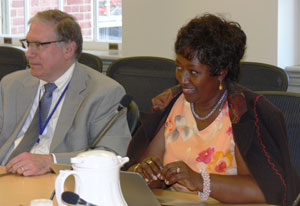Rwandan Health Minister Dr Agnes Binagwaho discusses research collaborations with NIH
July / August 2014 | Volume 13, Issue 4

Photo by Cathy Kristiansen/Fogarty
To encourage more Rwanda-U.S. research collaborations,
Minister of Health Dr. Agnes Binagwaho met with NIH Deputy
Director Dr. Lawrence Tabak and other senior NIH officials.
Rwandan Minister of Health, Dr. Agnes Binagwaho, visited NIH recently to discuss opportunities for research collaborations between the agency and her country, whose population continues to face many health threats from infectious diseases, especially HIV/AIDS and tuberculosis, as well as the growth of noncommunicable diseases.
Quality scientific evidence is vital to facilitate Rwandan health policy changes at the cabinet level, Binagwaho emphasized at a meeting attended by NIH Principal Deputy Director Dr. Lawrence Tabak and more than a dozen other senior Institute and Center officials with a strong interest in global health.
During her NIH visit, organized by Fogarty, Binagwaho also toured the Clinical Center and labs. While in Washington, she met with global health experts at USAID, several nonprofit partners and lawmakers on Capitol Hill.
Binagwaho, a pediatrician and Ph.D. candidate who has led her country's health ministry since 2011, said Rwanda is looking to partner in research capacity building in a wide range of areas, from cancer and mental health to genomics and child health.
In the 1990s, Rwanda had the world's lowest life expectancy - 27 years - but staged a remarkable recovery to reach 65 years by 2012. The country's experience with civil war, genocide and rape has left many emotional scars that undermine mental health, as well as a continuing heavy burden from HIV/AIDS and other diseases that erode physical health, Binagwaho noted.
NIH has supported a number of research projects in Rwanda over the past several years, predominantly HIV-related, but Binagwaho said more collaborations would help accelerate the expansion of research capacity and scientific progress. Fogarty grants, for example, support training of Rwandan scientists in bioethics and in the comorbidities of HIV, including cardiovascular disease, diabetes and metabolic conditions. Another project is establishing an East African hub for interdisciplinary research and training in environmental health, planned to include Rwanda.
Other NIH grants focus on how infection spreads, for instance, examining the interaction between HIV and women’s genital tracts and the role of estrogen in HIV transmission. Cervical and other cancers are also being studied in Rwanda, while additional projects examine mental health issues tied to living with HIV and protecting the psychological well-being of children suffering from HIV.
Rwanda health statistics
- Population: 11,458,000
- Annual per capita health spending: $66
- Domestic share of health spending: 47 percent
- Life expectancy at birth: 65 years
- Under-5 mortality rate: 55 children per 1,000 live births
Per 100,000 people:
- Incidence of malaria: 5,414
- Prevalence of HIV: 1,806
- Prevalence of TB: 114
Statistics from WHO Rwanda Country Health Profile 2012 and WHO Health System Financing Country Profile - Rwanda 2012.
Rwanda has made great strides in combating HIV/AIDS, with 90 percent of the country's HIV-positive population on antiretroviral treatment. Disease testing and prevention education are also widely available. In addition, the country reduced malaria incidence by 70 percent between 2005 and 2010 through aggressive distribution of insecticide-treated bed nets and spraying.
Binagwaho highlighted her country's efforts to reduce cervical cancer via the human papilloma virus vaccine. Rwanda was the first African country to introduce the vaccine, immunizing more than 90 percent of school girls nationwide through a donation from Merck, and will continue the effort with support from the nonprofit GAVI Alliance. It is also conducting systematic screening for this malignancy in women ages 35-45.
Many health burdens in Rwanda remain, and Binagwaho emphasized that connections between her country's scientists and NIH will go a long way to building research capacity and producing the scientific evidence that will help promote policy changes to improve the health of all Rwandans.
More Information
To view Adobe PDF files,
download current, free accessible plug-ins from Adobe's website.